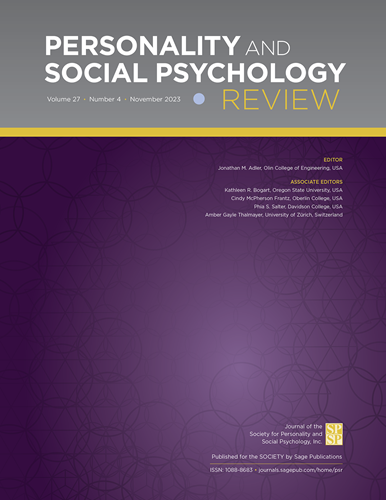在心灵的眼睛里探索视觉心理想象与刻板印象之间的关系
IF 10.4
1区 心理学
Q1 PSYCHOLOGY, SOCIAL
引用次数: 0
摘要
学术摘要 社会刻板印象是如何塑造和反映人们头脑中形成的形象的?长期以来,人们一直认为视觉心理意象对于刻板印象和偏见的形成、维持和延续至关重要。令人惊讶的是,社会认知研究最近才开始探索心理意象在这些现象中的因果作用。相反,认知神经科学对视觉心理意象(VMI)的研究则探索了意象在各种认知和行为现象中的关键作用。然而,认知神经科学在很大程度上忽视了刻板印象是如何影响心理意象的。本文从心理意象的角度对这两个领域的发展进行了历史性概述,并讨论了这两个领域交汇的最新进展。文章强调了进一步整合的机会,并提出了推进刻板印象和心理意象双重研究的建议。 公共摘要 社会刻板印象如何影响和反映视觉想象?长期以来,人们一直认为视觉心理意象在形成、维持和强化刻板印象和偏见方面发挥着核心作用。然而,直到最近,社会心理学和认知神经科学领域对视觉心理意象与社会刻板印象之间明确联系的探索还很有限。我们描述了这些领域在视觉意象方面的历史进程,并探讨了将刻板印象和心理意象研究结合起来的最新进展。此外,我们还提出了未来的研究方向,以加深我们对个体如何在刻板印象中利用心理意象以及心理意象如何改变刻板印象的理解。本文章由计算机程序翻译,如有差异,请以英文原文为准。
In the Mind’s Eye: Exploring the Relationship Between Visual Mental Imagery and Stereotyping
Academic AbstractHow do social stereotypes shape and reflect images formed in the mind’s eye? Visual mental imagery has long been assumed crucial in creating, maintaining, and perpetuating stereotypes and prejudice. Surprisingly, research in social cognition has only recently begun to explore the causal role of mental images in these phenomena. In contrast, cognitive neuroscience research on visual mental imagery (VMI) has explored the pivotal role of imagery in various consequential cognitive and behavioral phenomena. However, cognitive neuroscience has largely neglected how stereotypes influence mental imagery. This article provides a historical overview of the development of these two fields in terms of mental imagery and discusses recent advances at their intersection. Opportunities for additional integration are highlighted, and suggestions for furthering the dual study of stereotyping and mental imagery are provided.Public AbstractHow can social stereotypes impact and mirror visual imagination? It has long been assumed that visual mental imagery plays a central role in forming, maintaining, and strengthening stereotypes and prejudice. Yet, until recently, there has been limited exploration within social psychology and cognitive neuroscience on the explicit connection between visual mental images and social stereotypes. We describe the historical progression of these fields concerning visual imagery and explore recent advancements that unite stereotyping and mental imagery research. Furthermore, we propose avenues for future research to deepen our understanding of how individuals utilize mental images in stereotyping and how mental imagery can modify stereotypes.
求助全文
通过发布文献求助,成功后即可免费获取论文全文。
去求助
来源期刊

Personality and Social Psychology Review
PSYCHOLOGY, SOCIAL-
CiteScore
19.00
自引率
1.90%
发文量
20
期刊介绍:
Title: Personality and Social Psychology Review (PSPR)
Journal Overview:
Official journal of SPSP, the Society for Personality and Social Psychology, Inc.
Premiere outlet for original theoretical papers and conceptual review articles in all areas of personality and social psychology
Features stimulating conceptual pieces identifying new research directions and comprehensive review papers providing integrative frameworks for existing theory and research programs
Topics Covered:
Attitudes and Social Cognition: Examines the inner workings of the human mind in understanding, evaluating, and responding to the social environment
Interpersonal and Group Processes: Explores patterns of interaction and interdependence characterizing everyday human functioning
Intergroup Relations: Investigates determinants of prejudice, conflict, cooperation, and harmonious relationships between social groups
Personality and Individual Differences: Focuses on causes, assessment, structures, and processes giving rise to human variation
Biological and Cultural Influences: Studies the biological and cultural mediation of social psychological and personality processes
 求助内容:
求助内容: 应助结果提醒方式:
应助结果提醒方式:


